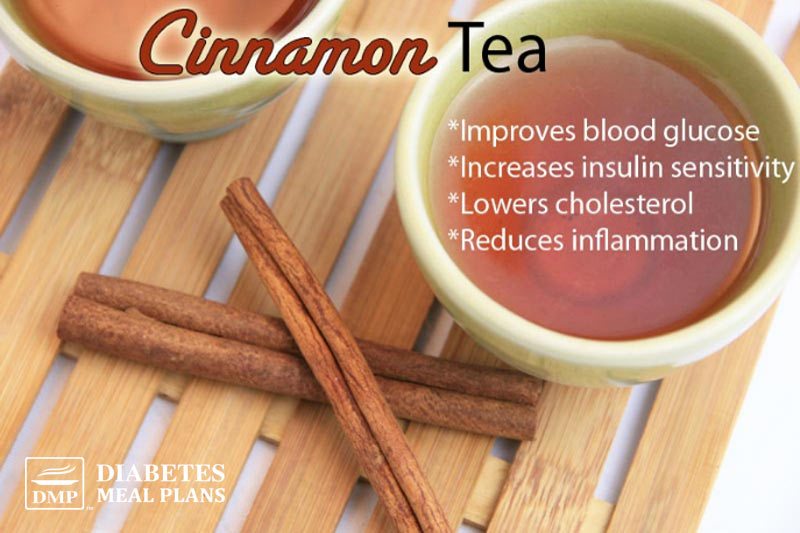Table of Contents[Hide][Show]
Exploring natural dietary strategies—like drinking tea—to lower blood sugar levels is a good idea, because the more you can minimize medication, the better off you’ll be. Plus, natural strategies support your body to be much healthier too.
Tea consumption—owing to its rich polyphenol and antioxidant content—has been studied for its potential benefits in regulating blood sugar levels.
Below we delve into the effects of several teas, including Oolong Tea, Chamomile Tea, Cinnamon Tea, Maté Tea and Mulberry Tea.
Specifically, we’ll look at their powerful influence on blood sugar and A1c levels, highlighting specific findings from scientific research.
Oolong Tea
Oolong tea, with its unique fermentation process, offers a distinctive profile of polyphenols.
Research has demonstrated that consuming oolong tea over a 30 day period may significantly decrease fasting blood sugar levels. In the study the blood glucose reduction was 67 mg/dL (3.7 mmol/L) – a pretty hefty improvement!
Oolong tea consumption for one month has also been shown to help decrease A1c levels.
The tea’s mechanisms include inhibiting glucose uptake in cells, and potentially moderating carbohydrate digestion and absorption.
You can buy oolong tea in both loose leaf or tea bags.
Chamomile Tea
Chamomile tea is not just for relaxation; its high flavonoid content also contributes to its blood sugar-lowering effects.
A study involving patients with type 2 diabetes found that consuming chamomile tea 3 times a day right after meals for 8 weeks resulted in A1c reductions of 0.03%, which is great considering its only from drinking herbal tea!
The study also found chamomile tea decreased insulin levels, improved insulin resistance and improved cholesterol levels, too.
Chamomile can also lower fasting and reduce postprandial (after meal) blood sugar levels.
In addition, chamomile tea may enhance the antioxidative status, providing protective effects against oxidative stress in diabetes.
Buy an organic chamomile tea online or find various options at most supermarkets.

Cinnamon Tea
Cinnamon tea comes from the bark of cinnamon trees and contains compounds called prosianidin, that may act similarly to insulin. While the tea itself has not been studied extensively, the benefits of cinnamon for blood glucose have.
In one study people took capsules for 90 days, which resulted in an A1c reduction of 0.83%.
A review of cinnamon for people with type 2 diabetes or prediabetes found the average A1c reduction was 0.54%. Another review found that cinnamon lowered fasting blood sugar by an average of 19.26 mg/dL (1.1 mmol/L) and an average A1c reduction of 0.24%.
Cinnamon’s bioactive components may enhance glucose uptake by cells, which is what helps to lower blood sugar levels.
Of course, you can take ceylon cinnamon supplements in capsule form, but the tea is so delicious.
Cinnamon tea has a wonderfully natural sweet flavor. Try making our cinnamon tea recipe.

Maté Tea
Maté tea, derived from the Yerba Maté plant, is rich in antioxidants and polyphenols.
When people with type 2 diabetes and prediabetes were given Maté tea 3 times per day for 60 days, those with type 2 diabetes saw their fasting blood sugar decreased by 25 mg/dL (1.4 mmol/l), A1c reduced by 0.85%, and with positive effects on cholesterol levels as well.
However, be warned, this is a caffeine-heavy beverage not suited to everyone’s metabolism.
Loose leaf Maté tea is the most available variety. Brew it in a tea pot or in a french press/coffee plunger.
Mulberry Tea
After several animal studies had shown therapeutic benefits of mulberry for blood glucose control, researchers put mulberry tea to test, giving people 70ml of mulberry tea after breakfast.
Positively, the mulberry tea lowered both fasting and postprandial blood sugar levels. For fasting levels it was 25 mg/dL (1.4 mmol/L) in the mulberry group; and for postprandial (after-meal) levels, that’s where mulberry really shined, with a reduction of 77 mg/dL (4.3 mmol/L) compared to the control group.
Mechanisms proposed are that therapeutic agents like mulberry may reduce absorption of carbohydrates, leading to lower after-meal levels.
Buy mulberry leaf tea online. You can get it as Mulberry leaf teabags; or mulberry tea combined with bitter melon, which is also beneficial for blood sugar.
Conclusion
Teas like Oolong, Chamomile, Cinnamon, Maté and Mulberry offer promising natural options for supporting lower blood sugar levels, with specific studies demonstrating their varied effects on both fasting glucose, postprandial glucose and A1c levels.
While research findings can vary, they underscore the importance of integrating natural dietary strategies into your routine as a method for assisting with better blood sugar control.
And the best benefit is, they help you do it naturally – and that’s always a great thing!

I have use three of these teas with great results oolong,chamomile, and cinnamon. I continue to use them and they taste good as well
I need any update
Hi Saleh, feel free to subscribe to our free weekly enews here and we also send you a copy of our recommended food list to help you get started.